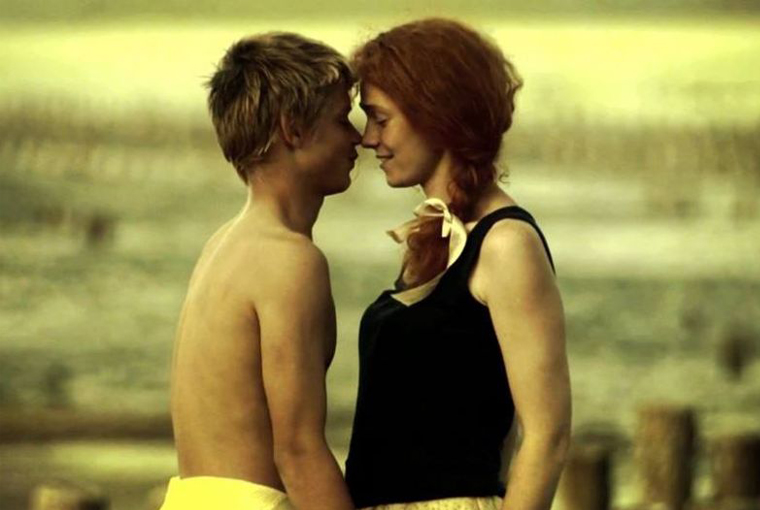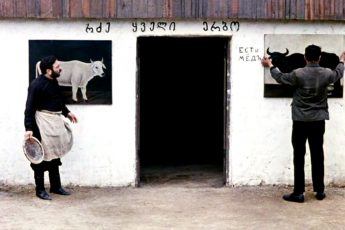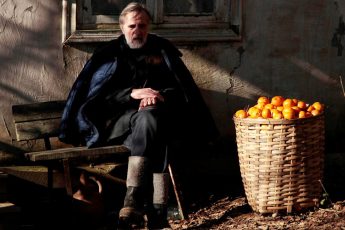Love on the Rocks
Nana Dzhordzhadze’s My mermaid, My Lorelei (Moya rusalka, moya Lorelyay, 2005)
Vol. 52 (April 2015) by Colette de Castro
To watch Georgian director Nana Dzhordzhadze’s new film My Mermaid, My Lorelei (2013), is to be reminded of another coming-of-age classic. Based on a Stephen King novel, Rob Reiner’s Stand by Me, which came out in 1986, is an exciting and realistic portrayal of American boyhood. Although that film is based on a singular event – the boy’s search for a corpse in an imaginary countryside village called Castle Rock -, its best moments are the ones that bring us back to childhood: poetic memories of never-ending games and well-meaning scuffles.
The 2014, Ukranian-produced coming-of-age drama My Mermaid, My Lorelei is also about kids on the cusp of manhood – interested but naive about sex, troubled but smart, blond and fresh-faced, free and roaming in the yellow grass. But while Stand by Me draws the viewer into the world of childhood, My Mermaid seems to be constantly drawing us into adulthood. When the boys climb onto the rooftop of their beloved’s house, we see them from the point of view of their angry parents, never seeing the house from the boys’ point of view – a vantage point up on the rooftop.
Indeed, the film leads us into the adult world both figuratively and literally, as the film is set at once in a music studio when the boys have become men – filmmakers who are making the music for a film about their childhood – and in the past, literally inside the film that is being made. This overlapping effect, while it makes us appreciate the soundtrack of the film, only seems to confuse the already somewhat scattered storyline.
My Mermaid focuses on the story of two 14-year-old boys who fall in love with an 18-year-old woman, Nyurka. Near the beginning, we witness a town fair, a procession and a shiny red truck. An auburn-headed beauty in a red dress tells the other girls (a bit too) confidently that she will win the prize truck, and ultimately does, laughing giddily and declaring she will leave for the city the next day. When she does, the two boys decide to ‘marry’ her so they can ride in the car too. Fedor and his friend decide to go and see a gangly mafioso who turns out to be Nyurka’s pimp. He plies them with cigarettes and alcohol in a local café and agrees to arrange their ‘marriage’ to her if they give him 40 kopeks. The pitfalls of commerce are cleverly expressed in the film. The boys’ sexual urges are expressed in social language – Fedor wants to marry Nyurka and falls in love, which is ultimately deflated by the reality of commerce; she is a prostitute, and as one well-wisher tells him, “no one marries whores”.
When the two boys arrive at the dock the morning after having sold the family Labrador to get cash, they hand over the money and find themselves waiting in line outside a whimsical, makeshift tent. Indeed, Nyurka’s hand is in great demand, as dozens of dockworkers are also awaiting their turn, playing pool and comically doing push-ups to prepare. One of the boys chickens out at the last minute and leaves the tent. The other boy, Fedor, sits on her bed in awe. A few scenes later we still find them sitting in the tent, she in a crown of thorns she has made, reciting lines from a play, while he watches happily. The film’s take on entitlement is interesting: the boys pay the highest price to see Nyurka (40 kopeks), the dockworkers pay relatively little to have a go with her (3 kopeks), and the policeman refuses to pay anything. He even becomes indignant when she suggests he come and visit her on the dock “like everybody else”.
One scene in this film is almost identical to another in Stand by Me – two boys, defeated but triumphant, walk home along disused railway tracks in heavy silence. In the American film a voice-over tells us what will become of the two friends, whereas in the Ukranian version the camera cuts to the music studio where the two adults argue about what the final scene of the film should be. In the former, life is presented with a childish simplicity as leading to a wife, a job. But in Dzhordzhadze’s film the ending has not been filmed. And so an adult film about childhood is rich in the loss of innocence.




Leave a Comment